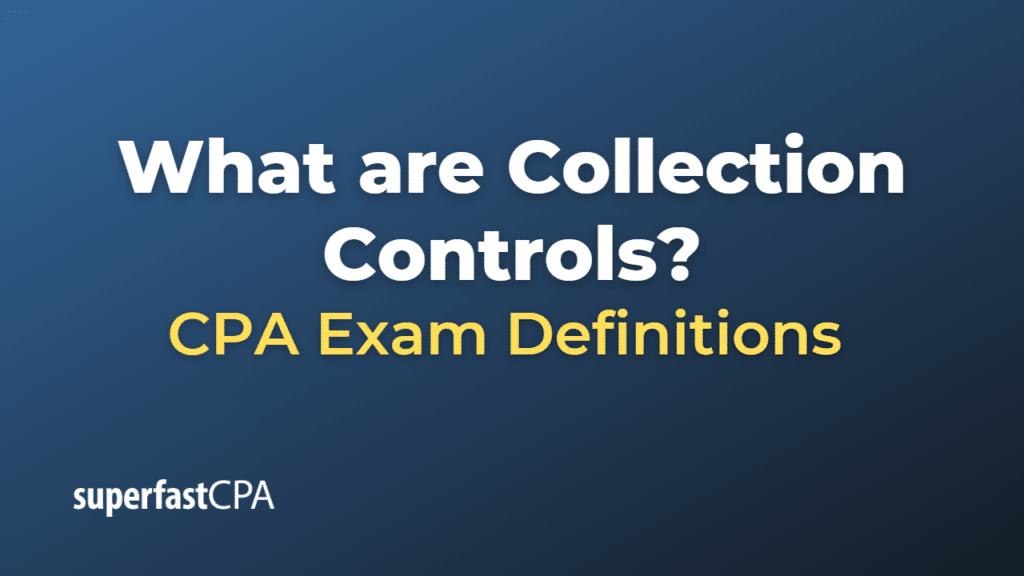Collection Controls
Collection controls are policies, procedures, and systems put in place by a business or a collection agency to manage and monitor the process of collecting outstanding debts effectively and efficiently. These controls help ensure that debt collection activities are carried out in a compliant, organized, and timely manner, minimizing the risk of errors, bad debts, or non-compliance with relevant laws and regulations, such as the Fair Debt Collection Practices Act (FDCPA) in the United States.
Some common collection controls include:
- Clear policies and procedures: Establishing written guidelines that outline the debt collection process, including the steps to be taken when a payment is overdue, the escalation process, and the roles and responsibilities of employees involved in collections.
- Segregation of duties: Separating the responsibilities of individuals involved in the collections process, such as billing, receiving payments, and recording transactions, to minimize the risk of fraud or errors.
- Regular monitoring and reporting: Implementing systems to track and report on key performance indicators (KPIs) and collection activities, allowing management to identify trends, assess the effectiveness of collection efforts, and make data-driven decisions.
- Training and development: Providing ongoing training and development opportunities for employees involved in the collections process to ensure they are knowledgeable about best practices, industry standards, and applicable laws and regulations.
- Document management: Implementing a document management system to securely store and organize all records related to the debt collection process, including invoices, payment reminders, and communication with debtors.
- Compliance management: Ensuring that all debt collection activities adhere to applicable laws and regulations, including the FDCPA or similar legislation in other jurisdictions. This may involve periodic audits or reviews of collection practices to identify potential areas of non-compliance.
- Use of technology: Leveraging technology, such as specialized collection software, to automate and streamline the collection process, track communication with debtors, and monitor payment arrangements.
By implementing collection controls, businesses and collection agencies can more effectively manage their debt collection processes, minimize risks, and improve the likelihood of recovering outstanding debts in a compliant and efficient manner.
Example of Collection Controls
Let’s take a look at an example of a small business implementing collection controls to manage their outstanding debts effectively and efficiently.
ABC Retail is a small business that sells electronic gadgets. They have experienced an increase in overdue payments from their customers. To address this issue, they decide to implement collection controls as follows:
- Clear policies and procedures: ABC Retail develops a written policy that outlines the steps to be taken when a payment is overdue, such as sending reminder emails, making phone calls, and eventually escalating to a collection agency if necessary. The policy also defines the roles and responsibilities of employees involved in the collections process.
- Segregation of duties: To minimize the risk of fraud or errors, ABC Retail assigns separate responsibilities to different employees. One employee is responsible for billing and invoicing, another for receiving payments, and a third for recording transactions in the accounting system.
- Regular monitoring and reporting: ABC Retail sets up a system to track and report on key performance indicators (KPIs) related to collections, such as the percentage of overdue invoices, the average days outstanding, and the total amount of bad debts. Management reviews these reports regularly to assess the effectiveness of their collection efforts and make data-driven decisions.
- Training and development: ABC Retail provides ongoing training for their employees involved in the collections process, ensuring they are knowledgeable about best practices, industry standards, and applicable laws and regulations.
- Document management: The company implements a secure document management system to store and organize all records related to the debt collection process, including invoices, payment reminders, and communication with debtors.
- Compliance management: ABC Retail periodically reviews its collection practices to ensure compliance with applicable laws and regulations, such as the Fair Debt Collection Practices Act (FDCPA) in the United States.
- Use of technology: The company invests in specialized collection software that automates the process of sending payment reminders, tracks communication with debtors, and monitors payment arrangements.
By implementing these collection controls, ABC Retail can more effectively manage its debt collection process, minimize risks, and improve the likelihood of recovering outstanding debts in a compliant and efficient manner. This, in turn, helps maintain the company’s cash flow and financial stability.













